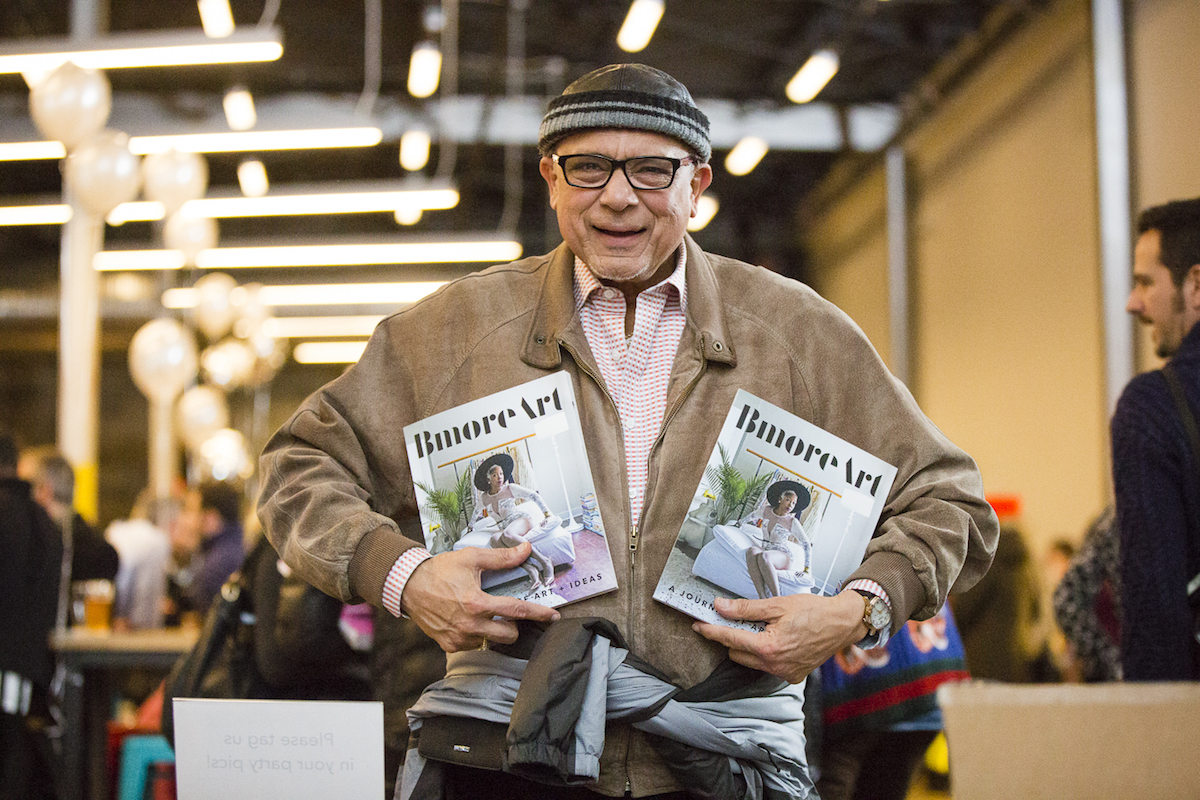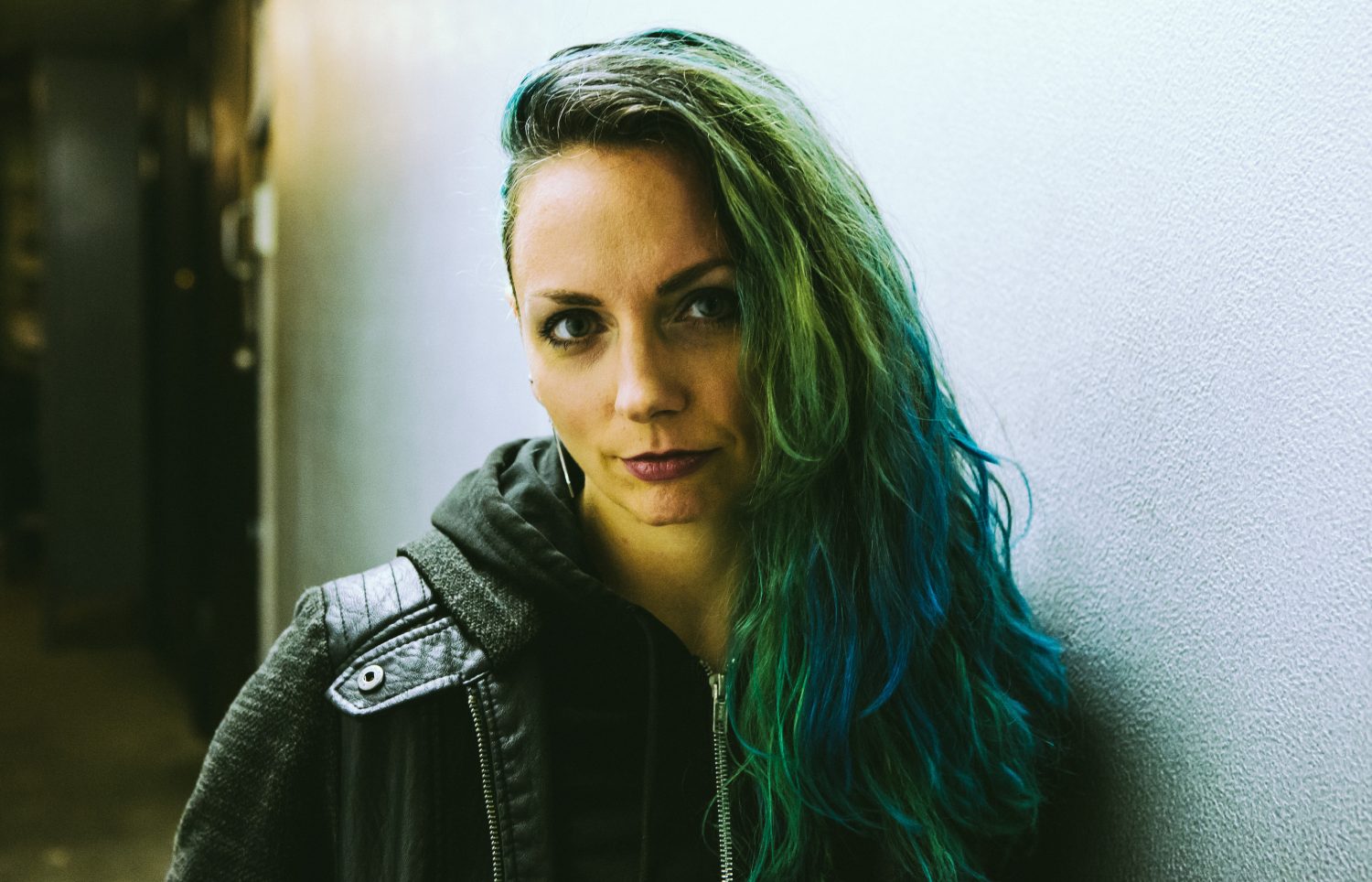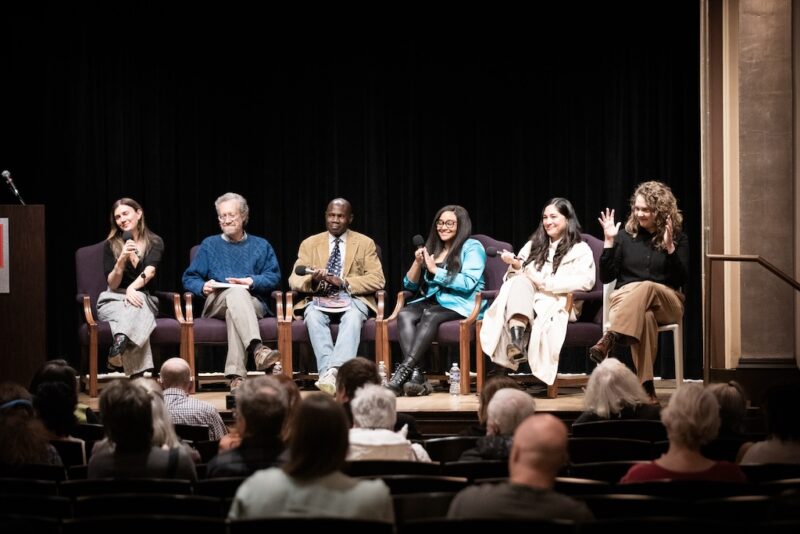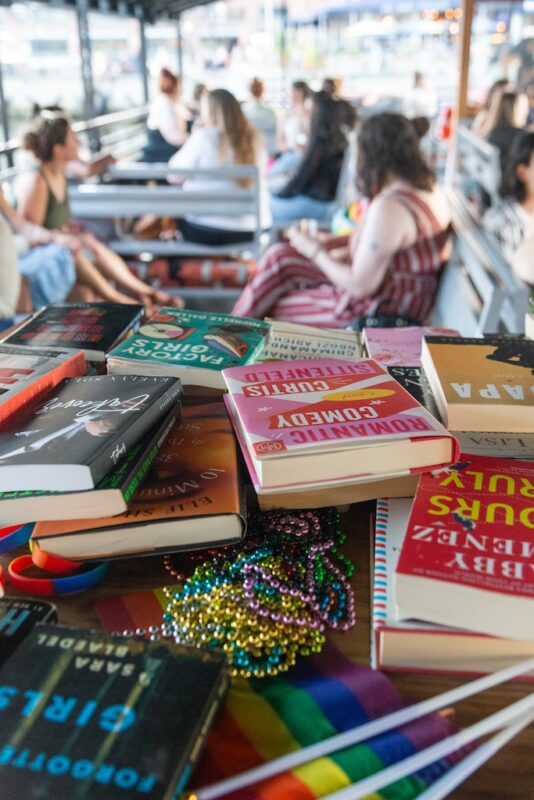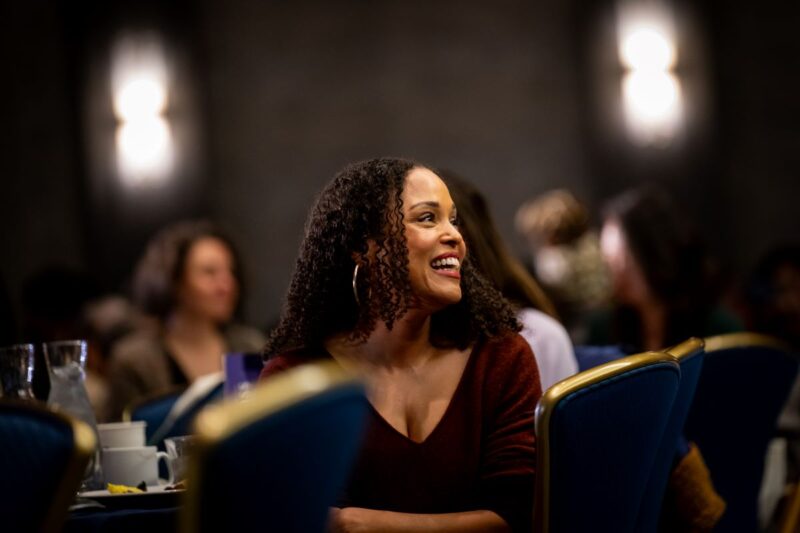For the past decade or so Shawna Potter, front woman for the hardcore band War on Women, has toured the world, recording and performing songs about feminist rage. And when she’s home in Baltimore, she spends a good amount of time providing safer spaces training for local venues, businesses, and collectives through her work with the local chapter of Hollaback!—a national organization devoted to ending street harassment.
Somehow, in between, she found time to collect her thoughts into a guidebook, Making Spaces Safer: A Guide to Giving Harassment the Boot Wherever You Work, Play, and Gather, published this month by AK Press. This spring, Potter is touring the east coast with a series of publication parties for the book, including a stop in Baltimore at 7 p.m. on May 23 at Red Emma’s.
This guidebook and its predecessor, the Making Spaces Safer pocket guide, published in 2018 with AK Press, serves as a kind of convergence of Potter’s worlds. Relying on key concepts like Hollaback’s Five D’s of Bystander Intervention (Direct, Distract, Delegate, Delay, and Document), Potter provides a valuable resource which is adaptable for individuals and organizations alike in combating harassment and violence.
The workbook-style approach is useful for individuals who need resources to engage in victim-centered response, and it is especially helpful for organizations in tailoring the ideas to their specific needs and establishing institutional memory. Organizations, especially small ones, lose memory for many reasons—diminished resources, staff turnover—and that can make them attractive to predatory opportunists. By focusing on developing organizational strategies, Making Spaces Safer is an essential toolkit for individuals and organizations alike to implement a victim-centered approach in pursuit of lasting systemic change.
Potter took a sushi break with me prior to the start of War on Women’s spring tour to talk about her book and the challenges of shifting from writing punk rock songs to writing proactive prose.

Rahne Alexander: You’ve been doing Hollaback workshops in Baltimore for a long time now, and more recently around the country. I feel like Baltimore has really been a proving ground for what you cover in this book, and I feel like I’ve seen the impact your work has had.
Shawna Potter: This book is based on the trainings I’ve done over the last five years and in Baltimore, it feels like citywide there are the same tactics being used in these venues that I’ve trained, the same basic principles and tactics are being applied, and so everyone sort of rises to the same level and people can tailor it depending on their space. And that’s kind of my hope with this book, that in the future, every club I play on tour will know exactly what to do if I’m harassed and I can count on that. From there, if people want to get more radical they can, but this stuff is really not that radical and it should be really normal.
This new book is a continuation of the Making Spaces Safer pocket guide you published last year with AK Press. What prompted you to start writing a book about safer spaces in the first place?
I think it came from a place of just wanting to save my voice on tour. In the summer of 2017 War on Women was performing at Warped Tour every day for two months straight, and I was also doing workshops on safer spaces and bystander intervention. I was just so concerned about being able to sing up until the end.
I remember being so excited to hear you were going out on that tour, and that you were going to be able to do workshops on safer spaces all around the country, in addition to performing your music. I imagine you must find those workshops just as fulfilling?
I really love doing safer space workshops so much, I love being in the room with people, seeing those wheels turn, seeing them connect to the material and say, “Oh, that makes so much sense. Now that I’ve heard someone say it out loud, I can do that. I do have power.”
Was there a noticeable difference in the Warped Tour workshops and the Hollaback workshops you’ve done for so many years?
Yeah, actually most of the people I spoke to did not claim to have a role of authority. The trainings I do here at home and on the road, I’m talking to the people that manage clubs or work at the club or the bookstore or the bagel shop. But the folks on Warped Tour mostly just identified as audience members. They go to those spaces and need those protections themselves maybe, but also want to intervene even if they don’t have authoritative roles.
So a lot of what we talked about was bystander intervention and how that applies to the environments they are usually in. And what was cool about doing that workshop on that tour is that whatever group of people I was talking to that day, I could really tailor it to them specifically. We talked the five D’s of bystander intervention and healthy flirting a lot.
What was your experience like writing the pocket guide? I imagine it felt urgent.
Basically at the end of that tour I thought, I should really write all this down. I knew that this was information that people were primed for. I knew people wanted to know, well, what’s the next step? What do we do about all this harassment and abuse that occurs? So one night I was going to sleep, and all of a sudden I was wide awake, and I had all these words that I had to get out. My apartment is dark, my partner is sleeping, I went into the living room and I turned on a tiny, little light so I wouldn’t disturb anyone and started writing. Much of that pocket guide is those first notes.
“If people want to get more radical they can, but this stuff is really not that radical and it should be really normal.”
I was honored when you asked me to read the pocket guide and the book in drafts as it was coming together, and I know you had a few readers helping to refine your work. I know it can be challenging to put my work into the hands of an editor; what was it like for you?
I could not have done this book without my editor Charles at AK Press. I remember saying, “Thank you, AK, for taking me on. You’ve got to put me with a heavy-handed editor.” I’m an idea man, you know, and I could not have done this book without my editor and all my lovely consultants and contributors who told me when I was fucking up and could do better. This book is absolutely an example of “It takes a village.”
Is it challenging to shift between songwriting and writing prose?
AK Press really wanted a full-length book, and so I put all this work into the pocket guide and I was so thrilled and they were like, “Cool, now it’s time to start working on the book,” and I was like, “Oh my God.” I remembered why I was so drawn to writing lyrics because they can take up maybe a couple paragraphs and then you’re done, and if it’s clever enough, that’s all you need.
I’m excited to see how the book does, since the pocket guide seems to have done really well.
It sells really well at our merch table, and other bands want to take it out on tour with them and give it to venues. I’m trying to encourage bands I know to sell copies and put the pocket guide in the hands of every venue. How many more people would feel free to leave the house and have a break from all the shit that they’re going through, knowing that their favorite bar down the road is cool and has their back if something happens?
Last year I saw Speedy Ortiz at the 9:30 Club and Sadie Dupuis told this whole sold-out crowd about you and your book, and it was marvelous to witness. It’s awesome that people with a bigger platform help advance your message.
I’m very lucky to know some cool folks from touring for so long, and that I could ask for their help on this project. I got Sadie to submit a story to the full-length book. One of the big differences between the book and the pocket guide is that it has more background information on why harassment is bad and cumulative, and why victims don’t always behave “the way we want them to.” There are more stories about harassment, how it feels, anecdotes of people that have done safer space work and why they think it’s important. I’m giving you more of a why. I think understanding the why behind it makes it so much easier to improvise when you’re not quite sure how to best support people at any given situation.
I love that you’ve opened this book to other people to offer insights and stories. That aspect makes the book so much more effective, especially because your guests come from so many professions and points of view.
I didn’t want just musicians because it’s not just about going to rock shows. That’s too limiting. I didn’t want just white women. I didn’t just want academic voices, because I don’t have an academic voice. I wanted people from different backgrounds that have taken different roles in spaces, they’re the patron or the one in charge. They’re an artist or they’re an activist. I really do believe that this information should be accessible to as many people as possible and that it can apply to so many different situations. If you leave the house ever, this information will touch your life—it could make your life better.

Shawna Potter (photo by Josh Sisk)
What kinds of improvements have you witnessed in places where you’ve done workshops?
There’s always been DIY clubs that have “No racism, no homophobia, no sexism will be tolerated” on the wall, but I see more and more venues of varying sizes and types also with signs. Have they done the work? Do they really know what to say or do in a victim-centered way? I don’t know. If they read my book I know they do, but at least that’s happening. At least they know they can’t be silent about it anymore.
I see improvement in every place that I train, whether a space has no clue as to what they’re supposed to do and they’re really reaching, or everyone’s pretty knowledgeable already and they’ve tried some stuff and they just want to be sure they’re not missing out on anything. And there’s always room for improvement. People would tell me stories, like “Oh, a week after you came and trained us an incident happened and I knew exactly what to do and I didn’t before.” It’s really empowering the people in charge of these spaces that have the control to shut something down if it’s problematic and to provide that support for victims so that everyone knows what is and is not acceptable in that space.
The current political atmosphere in the US is so interesting right now, because on one hand it’s completely terrifying for so many of us, and on the other there has been such an amplification of voices of strong women, Black people, indigenous people, people of color, LGBTQ+ people…
I believe the rise in overt “isms” is a direct consequence of the head of our country normalizing it. Without people leading our country that set an example that we can all look up to and strive for, we have to do that ourselves. We have to be the example, we have to make up for how overt and tough things have gotten, how scary they’ve gotten. So I believe it’s any reasonable person’s duty to overtly state, “Everyone is welcome here, and discrimination is not okay. If you’re harassed in here, we have your back.” We have to be as overt as the people that are filled with hate, and this book gives you the tools to do that.
And even when you have the tools, it’s hard to always be at the ready to counteract.
It’s so hard, especially when you’re not used to it. It’s still challenging for me, and I wrote the damn book. There are so many factors, like “Do I have time for this? I’m on my way to work, too. That person looks really scary to me, and I don’t want to be the target of their hate right now either.” And I think a lot of it is just inertia, that bystander apathy effect where if no one else is saying anything, you don’t really do it either because that’s out of the norm. What I try to be really clear about is that you have to be the first person to speak up. You are going to make it easier for everyone around you. You gotta be willing to do it, and that means practicing. I means talking about the five D’s, and imagining what you would say and then say it. The more you do it, the easier it becomes.
There was a time recently, I was in some shop and the owner—white owner, Black employee—was just laying into this employee, who a moment ago was being very helpful to me. He was supposed to be putting boxes away or something. But instead, he’d rather talk to me and help me instead. But he’s laying into him for not doing this box thing and for helping me instead. I was just in shock that this was happening right in front of me, that they were having this argument. I just paid for my item and I got out of there and I thought on my whole drive home, I should know better. I should have said something, I wrote a book about this. If I can’t do it, how can I tell other people to do it? So it was delayed, but I ended up calling the shop just to say, “Hey, I was in there earlier, this is what I saw, and in my opinion, I think that’s really not cool that you were yelling at the guy, and it doesn’t look good to customers,” and I used the word “racist” so that they would know I wasn’t being vague.
I think it helps to have learned how to be on stage, to be the one with the microphone.
I mean, obviously it helps. It does help in being able to take that initiative. I’ve been playing in bands since I was 14, so over time you’re just going to be comfortable in a crowd, and with age, you stop giving as much of a shit about what other people think of you and it’s easier to just do the right thing and not care if someone judges you for it.
When we started War on Women, there were moments where I’d think, “I should probably do something or say something,” and I’d think, “All right, what would the singer of a feminist hardcore band do? Okay, I’m going to do that.” I’d ask myself, “If I were a fan, what would I want the singer of War on Women to say or do in this situation? Okay, well I’ll just do that.” So I became that. I think it’s an interesting way to go about psyching yourself up for things that might be difficult, and I want to give that advice to everyone—women or femmes or people socialized as women. Eventually I didn’t have to keep imagining myself as that person. Eventually I was just acting as that person, and so that gave me more self confidence to speak up about injustices.
I just got this image of you in one of those ‘70s cartoons where there was a rock band that also fought crime and, I mean, that’s kind of what you’re doing.
I love that! I need an outfit, right? Some kind of emblem? You’ve seen my show. I can kick, in heels.
The book release for Making Spaces Safer will be at Red Emma’s on May 23 at 7 p.m. For more info, visit the Red Emma’s website.
Featured image credit: Christopher Sikich.
